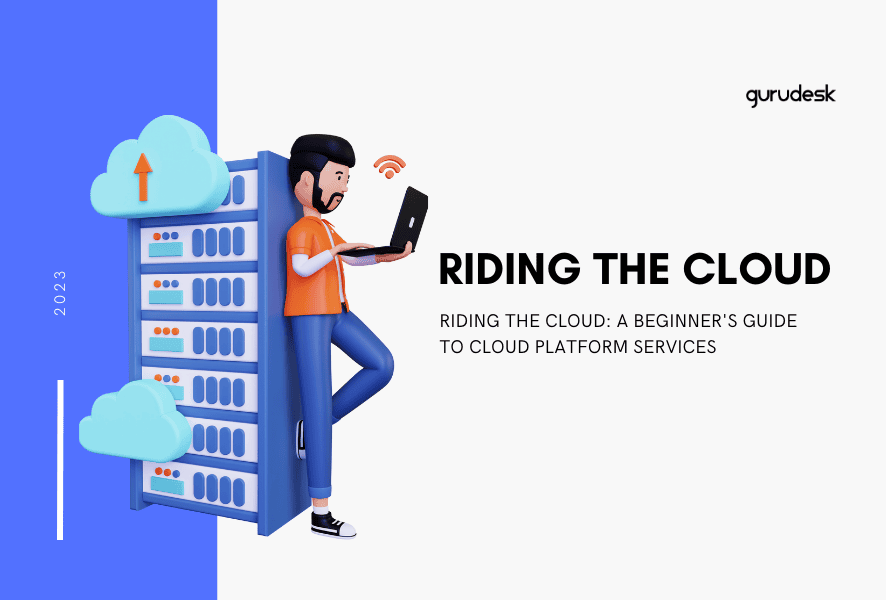
Cloud Platform – The digital world evolves constantly, and if you are not a geek, it might be hard for you to keep up. Are you wondering what a cloud platform is? Explaining technical terms to internet dummies is easy peasy lemon squeezy for us!
It is easy to get confused with all these new technologies emerging every second.
Cloud platform is the on-demand service of computer system resources, including tools and applications such as data storage, servers, software, and analytics over the internet.
What is it good for, you ask? The answer is it has many benefits! But more on that later; we need to cover the basics first.
Why is Cloud Platform Important?

The bigger a company is, the more storage it needs. Before cloud platform was developed, companies had no option but to store all their data on hard drives and servers. But now, cloud data exists, and the sky is the limit!
Cloud platform makes managing data, applications and other IT infrastructure a breeze! You don’t need to worry about purchasing, installing, or maintaining servers or hard drives for storing large amounts of data – cloud services make all of this much more accessible. With cloud computing, you can access cloud services from anywhere in the world with an internet connection. No need to be tied down in one physical location.
The cloud can store data, applications, and other IT infrastructure much more cost-effectively than traditional methods. Plus, cloud platform allows companies to share and collaborate on projects remotely with ease–which is a major advantage for businesses today! Cloud computing is an invaluable tool for businesses, and it’s here to stay! That being said, you don’t need to be a cloud expert to understand how cloud platform works. The basics are simple: cloud services make data storage, applications, and other IT infrastructure much more accessible.
The digital world is constantly evolving, and cloud platform has become an essential part of this transition into the digital age. By leveraging cloud computing services, companies are able to save money while also increasing productivity, efficiency, and security. So don’t get left behind, cloud platform is here to stay! Get on board and take advantage of its powerful capabilities today.
How Cloud Platform Benefits Businesses

Cloud platform changed the world of web hosting. Businesses looking for larger storage spaces and efficient data backup solutions turn towards cloud computing services.
Reduced capital expenses
You need capital to buy hardware, software, setups, and running on-site data centers. Cloud platform reduces these capital expenses by allowing you to trade fixed costs into variable ones. By having cloud-based data storage, companies no longer need to invest in costly hardware to store their data. Instead, cloud platform can reduce these costs by allowing businesses to pay for only the storage they actually use and only when they need it. So you only pay for what you consume, which is only fair.
With cloud platform, businesses can store and access large amounts of data quickly and easily. This means that businesses have the convenience of being able to retrieve their data whenever they need it. It also has the added benefit of being cost-effective since cloud platform eliminates the need to invest in additional hardware or software.
If you’re looking for a solution that allows you to store and access your data without breaking the bank, cloud computing might be right for you. Prepare to reap the cost-saving and convenience benefits of cloud platform! It’s an excellent approach to make the most of your data.
Elasticity
Think of cloud platform as the ultimate utility, like a magic remote control for your tech needs. Just like how you can turn the water or electricity on and off in your house, cloud platform lets you turn computing power, storage, and bandwidth up or down as you need it.
It’s super convenient because you only pay for what you use, instead of having to fork over a ton of cash for infrastructure that you might not even use all the time. Plus, it makes it super easy to handle those times when you suddenly get a ton of traffic or need to process a bunch of data. It’s like having a personal genie on call, ready to grant your tech wishes when you need them.
Agility
When it comes to making modifications and adjusting to new circumstances, the cloud platform is quite agile.
Altering your IT system the old fashioned way may be a costly and time-consuming endeavor. New resources may be created or old ones modified with a few mouse clicks using a cloud platform. This allows for quicker iteration and the testing of novel concepts, ultimately leading to more timely product launches.
The cloud makes it very easy to move your apps and data around. Depending on where your customers or users are, you can put them in different places. So, you can give them the best experience possible, with as little lag as possible.
It’s as if you could wave a magic wand over your IT infrastructure. You can change things, add new things, or move things around as needed without getting too hot and bothered. The agility that cloud computing provides is a game changer for any business that wants to keep up.
Reliability
Cloud platforms are like the ultimate wingman, always there for you when you need them. They’re dependable and you can trust them to have your back.
One of the best things about cloud platforms is that they’re built on a bunch of servers that work together like a well-oiled machine. So if one server starts acting up, there’s always another one ready to step in and save the day. You know, like how you always have a backup wingman in case your first choice flakes on you.
And the best part, most cloud computing services like AWS, Azure, and Google Cloud are like a squad of wingmen, they’ve got your back in multiple locations, so you’re covered no matter where you are. It’s like having a squad of wingmen ready to help you out, in case one of them gets tired or something.
Plus, they’re always working on security, like a good wingman always checking on the safety of you and your squad. So you can trust them to keep your data and apps safe from any unwanted guests.
Overall, cloud computing services are always there for you, dependable and reliable, like a good wingman should be.
Security
Cloud platform services can also be your ultimate bodyguard for your data on top of being your wingman. They’ve got your back and keep your cloud data safe from any bad guys.
One of the best things about cloud security is that the heavy lifting is done by the cloud platform services. They’ve got a team of experts that make sure your data is safe and sound, so you don’t have to worry about hiring your own security team or buying expensive equipment. It’s like having a personal security team without the cost for your sensitive data.
And the best part, most cloud platforms come with built-in security features like encryption, multi-factor authentication, and access controls. It’s like having a bouncer at the door checking ID’s and making sure the bad guys stay out.
Another advantage of cloud security is that it’s super flexible, you can add more security features as you need them, like hiring more bouncers for a big party. This means you can adapt to changing security threats, just like how a good bouncer can handle any situation.
And if you’re worried about passing any inspection or regulations, most cloud providers offer various compliance certifications like SOC, ISO, and PCI-DSS. It’s like having a VIP pass to the best clubs and venues.
In summary, cloud platforms are like having a whole security team, with built-in features, scalability and compliance certifications, keeping your data safe and sound, and making sure you’re always in compliance with regulations.
Who Uses Cloud Platform?

Hey, you know all those apps you can’t stop scrolling on like Facebook and Instagram? How about ones you use every day like Google Drive and Gmail? Well, guess what, they’re all hosted on cloud computing services!
When you use those apps, you’re sending your data up to the clouds (figuratively speaking) where it gets stored on servers. And it’s not just you, a ton of businesses use cloud services too, no matter what industry they’re in. For example, even banks use cloud computing platforms for fraud prevention and detection.
So basically, whether you realize it or not, you’re a pro at using cloud services. It’s like you’ve been living in the clouds all along!
Cloud Platform Types
There are three types of cloud platforms.
- Infrastructure as a Service (IaaS)
- Platform as a Service (PaaS)
- Software as a Service (SaaS)
Infrastructure as a Service (IaaS)
IaaS stands for Infrastructure as a Service, and it’s like renting a bunch of computers in the cloud. It’s a great option for businesses that need a lot of flexibility and control over their IT infrastructure.
With IaaS, you can easily scale up or down your cloud storage as your business needs change. Need more storage? No problem. Need more computing power? Easy peasy. It’s like having your own personal IT department, without the cost and hassle of actually having one.
Another cool thing about IaaS is that you don’t have to worry about maintaining or upgrading the physical infrastructure, like servers or cloud storage. That’s all taken care of by the IaaS provider. So you can focus on running your business, while they handle the technical details.
Platform as a Service (PaaS)
PaaS stands for “Platform as a Service.” It’s like having a personal assistant for all your app development needs. It’s a platform in the cloud that handles all the boring stuff so you can focus on making great apps.
With PaaS, you can concentrate on building and using your application instead of managing and maintaining the underlying servers, storage, and databases. The PaaS provider will do everything for you. Now you can focus on developing and launching your applications and services without being concerned about the technical details.
Additionally, PaaS offers a wide variety of services and tools that simplify app creation, testing, and release. Programming languages and frameworks, testing and debugging instruments, and service hosting and scalability infrastructure all fall under this category. Therefore, it’s a fantastic choice for enterprises who need to create, launch, and expand their applications rapidly.
Software as a Service (SaaS)
Last but not least, we have SaaS. This is like having your own personal software but it’s delivered over the internet, and you can use it on a subscription basis. It’s perfect for businesses that want to use a specific software without having to worry about the technical details of hosting and maintaining it.
So there you have it, three types of cloud platforms to choose from depending on your needs. IaaS, PaaS, and SaaS all have their own unique advantages, so it’s important to figure out which one will work best for your business.
Cloud Platform Providers
Let’s talk about cloud computing, it’s like a buffet of options and capabilities that can suit pretty much any business need. Here are some of cloud computing resources that are used globally:
- GuruDesk
- Amazon Web Services (AWS)
- Microsoft Azure
- Google Cloud Platform (GCP)
- Alibaba Cloud
- Oracle Cloud
- IBM Cloud (Kyndryl)
- Tencent Cloud
- OVHCloud
- DigitalOcean
For example, Google cloud storage is like having a trusty sidekick to help you keep all your important files, videos and images safe and sound. It’s a service offered by Google as well as a Google compute engine, that lets you store your data on their powerful infrastructure and Google cloud dataflow, so you know it’s in good hands. You can access your work presentations and spreadsheets from anywhere, anytime, on any device. And talking about remote access, you have email, calendar, Skype, WhatsApp, it’s like having your personal data with you wherever you go, and always up to date.
Another cool thing is Zoom, it’s like a cloud-based conference room, you can record your meetings and save them to your cloud storage, so you can connect to them later from anywhere. And another great option for communication and collaboration is Microsoft Teams.
And for developers, you have AWS Lambda, it lets you run code for applications or back-end services without having to worry about servers, and you only pay for what you use. Other cloud providers also have similar options, such as Google Cloud Functions and Azure Functions.
Those cloud computing resources also offer a thing called cloud CDN (content delivery network). It’s a network of servers that are distributed around the world, that work together to deliver content to your website visitors as fast as possible.
Cloud CDN is like having a fleet of speedy delivery trucks, strategically parked in different parts of the world. So, when someone requests content from your website, the closest truck is ready to deliver it to them in a jiffy. This means that no matter where your website visitors are located, they’ll be able to connect to your content lightning-fast.
Deployment Models of Cloud Platform

Private cloud model
A private cloud is like having your own personal cloud that’s only for your company’s use. It’s delivered from your company’s own data center and it offers the same flexibility and convenience of a public cloud, but with added security and control.
With a private cloud, you get to build and maintain your own cloud infrastructure, It’s like having your own IT department but without the hassle. It allows you to have more control over your data, applications, and services and you can also customize the environment to fit your specific needs.
Another advantage of a private cloud is that it offers a higher level of security as the infrastructure is only accessible to authorized internal users. This is especially important for companies that deal with sensitive data and need to comply with strict regulations.
Private clouds are usually used by large organizations or companies that have specific compliance requirements, or need to keep their data and applications behind their own firewall for security reasons.
Public cloud model
A public cloud is like renting a room in a big building where you share the cloud infrastructure with other tenants. Public cloud resources offer a wide range of services, like a depot, computing power and databases, over the internet, so you can connect to them on a pay-as-you-go basis.
With a public cloud, you don’t have to worry about setting up and maintaining the underlying infrastructure. The provider takes care of all that for you. This means you can focus on using the services and scaling them up or down as your business needs change.
One of the main advantages of public cloud is that it’s highly scalable and flexible, so it can adapt to your business’s needs as it grows. Additionally, it’s cost-effective and you only pay for what you use, which makes it great for small and medium businesses.
Hybrid cloud model
A hybrid cloud is like having a personal assistant who can handle your workloads both at home and outside. It’s a combination of public cloud services, like AWS or Azure and your own private cloud, like your personal server. It works like a team where the public cloud handles workload bursts or spikes in demand and the private cloud takes care of mission-critical workloads, maintains cloud infrastructure or sensitive applications.
Goal of Cloud Platform Services
The goal is to have a unified and automated environment where you can scale as you go, and you have the best of both worlds: the convenience of public cloud and the control of your own private cloud for your sensitive data.
TAGS:
Join the GuruDesk community and be among the first ones to discover the hottest trends in web services! We are a team of web experts and we love sharing our knowledge and experience with our readers! We share tips and tricks on a wide range of topics, including web development, cloud services, and hosting. Whether you are a seasoned pro or just starting out, we promise you will find valuable information here. So go ahead, hit that “Subscribe” button and let the fun begin!






